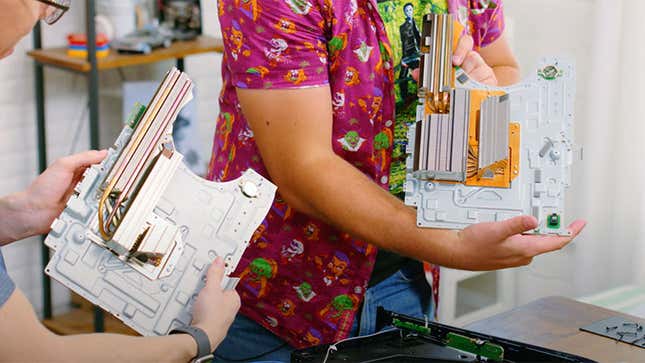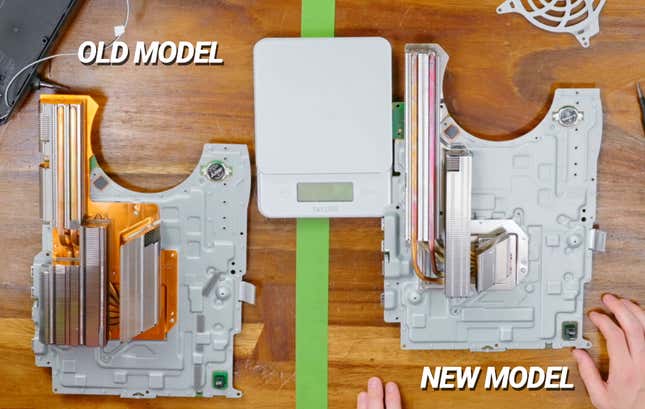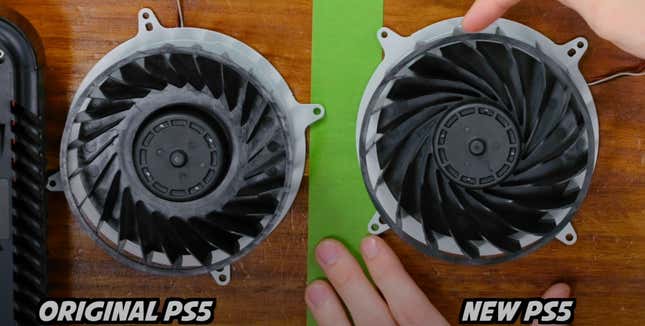
When a new model of the PS5 was quietly released recently, people talked about a new screw, and how it might have better wi-fi. One thing that wasn’t known until now is that the console’s mini-refresh has a much smaller heatsink. A video filmed comparing it to the existing model shows it running at higher external temperatures.
YouTuber Austin Evans got hold of one of these new consoles from Japan recently, and in tearing it apart found that when you open the things up it’s pretty clear right away that the changes between models are more dramatic than a new screw.
The first thing he found was, OK, that new screw used to attach the PS5 to its base is good. But it didn’t take long before he noticed that while running the same game at the same time, the new console’s fans sound different than the launch model. At first he suspected this was down to a difference in cooling systems, which was sorta correct!

Testing the console’s temperature externally, he found that the newer model was consistently running at 3-5 degrees Celsius hotter than than the original, that it was drawing a few more watts while in operation, and was oh-so slightly quieter, though those latter two values were by fairly insignificant margins.
It’s opening the new PS5 up where we can really see where Sony has made changes between the launch model and this one, which is currently only on sale in Japan and Australia. This new console is around 300g lighter, and arrives soon after Sony announced that the PS5 was “no longer selling at a loss.” It looks like both those things might be related, when you take a look at their heatsinks.

Look at that! The original model had a much larger heatsink, plus a large copper backing plate, while the new version has a lot less. To at least partially compensate for this, Sony has included a new fan design in the console, one that has much larger blades:

In response to his findings, a few people have questioned Evans’ capture of external temperatures, to which he replied:
Couple people mentioning higher exhaust temps COULD mean the cooler is doing a better job dissipating heat. The thing is, Sony removed a SIZABLE amount of the heatsink on this new model. With fewer fins and smaller heatpipes it simply isn’t as efficient at moving the heat out of the console.
Think about it as if it were a PC. If I remove a large CPU heatsink in favor of a smaller one the exhaust coming off my system would be hotter as the overall system temps are higher since the weaker cooler can’t cope. That’s exactly what’s going on here IMO.
It’s also important to note that this isn’t a case of comparing two radically different consoles. Were this an all-new revision of the PS5, then it could be argued that a smaller heatsink could just be a result of new and improved chips and technology elsewhere in the console. But this isn’t an all-new revision—almost everything else is the same PS5 as we’ve had since last year—only now with less cooling.
Some context: none of this is terrible news. Consoles are revised constantly throughout their lifespans, sometimes with major new models, other times with minor tweaks like this, and every single time this happens corners are cut—not just to keep costs down but also to adjust things based on months and years of findings. And a console running three degrees hotter doesn’t mean it’s going to suddenly melt into a puddle of white plastic on your entertainment unit.
But if these findings are consistent across games and for long periods of time, a potential temperature increase on a PlayStation console isn’t something we should just shrug off, either. As they note in the video, this is something Sony has struggled with for years; I had two PS3 consoles overheat, and my PS4's heat and fan noise problems got so bad towards the end that I simply stopped playing the thing. So seeing Sony cutting corners on temperature control so early in the console’s lifespan, when we haven’t seen the real effects of long-term use, isn’t great.
In the meantime, one of the other things people were wondering about with this revision was whether the console’s shoddy wi-fi had been improved, and while Evans couldn’t confirm this with a proper wi-fi test, he did note that the new PS5's wi-fi module did have different cabling and cable colours.
You can watch the full video below:

